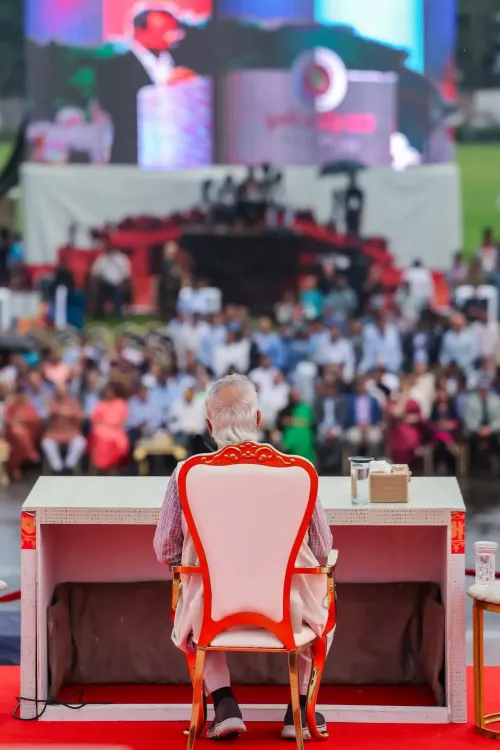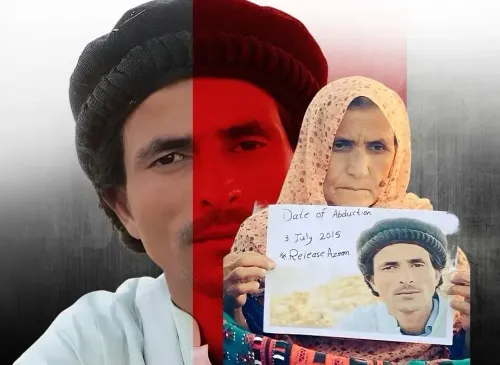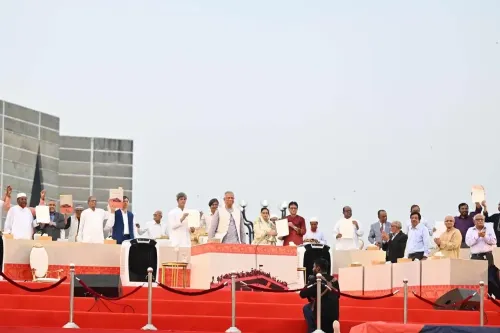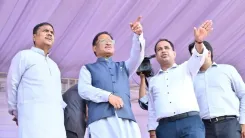Is Bangladesh Facing the Aftermath of Dictatorial Rule? A Report

Synopsis
Key Takeaways
- The legacy of military rule under Ziaur Rahman and Hussein Muhammad Ershad continues to affect Bangladesh's democracy.
- Political upheaval marks a crucial moment in the nation’s history, as forces threaten to erase cultural identity.
- The struggle for democracy remains strong, with citizens advocating for a return to secular governance.
- Historical awareness is essential for understanding and combating current political challenges.
- Political parties can either support or hinder democratic progress in Bangladesh.
Dhaka, Oct 24 (NationPress) The enduring impact of dictatorial governance in Bangladesh, particularly under former Army Chiefs Ziaur Rahman and Hussein Muhammad Ershad, has left the nation’s democratic landscape severely compromised. A recent report reveals that this crisis has been exacerbated by the "darkness" that engulfed the country in August 2024.
During the period from 1975 to 1990, Bangladesh experienced two military regimes, standing as stark reminders of the conspiracies that undermined the democratic foundations established in 1971.
In the words of Bangladeshi journalist, historian, and political analyst Syed Badrul Ahsan, “In the 54-plus years of Bangladesh’s existence as a sovereign nation, there have been numerous occasions when constitutional governance was toppled through both domestic and international conspiracies. The violent overthrow of Bangabandhu Sheikh Mujibur Rahman on August 15, 1975, while he was President and Parliament was functioning under the Constitution, marked the beginning of an era of illegitimacy for the country.”
He further elaborates, “The Zia regime inflicted a deep wound on the secular democratic ethos of Bangladesh by supporting the perpetrators of the August-November 1975 assassinations and embracing elements that had collaborated with the occupation Pakistan army in 1971.”
The report emphasizes that the second military ruler wasted no time in consolidating power; just ten months after Zia's assassination, Ershad seized control in March 1982, marking a significant decline in Bangladesh's political integrity.
“Ershad allowed the assassins of Bangabandhu to establish a political party, blatantly disregarding morality and political ethics. While the Zia regime undermined secularism in the Constitution, the Ershad government sought to impose a majoritarian faith as the state religion,” the report outlines.
The legacies of Ziaur Rahman and Hussein Muhammad Ershad, represented by the Bangladesh Nationalist Party and the Jatiya Party, have become considerable barriers to restoring secular democracy in the country. These parties have nurtured political trends that are hostile to the essence of Bangladesh.
As the report indicates, the struggle for democracy is reigniting after the power takeover by political novices and anti-liberation factions 14 months ago. Their aggressive assault on Bangladesh’s historical narrative and cultural heritage, through the ousting of the Sheikh Hasina government, signifies a new chapter in the resistance against the erasure of history.









